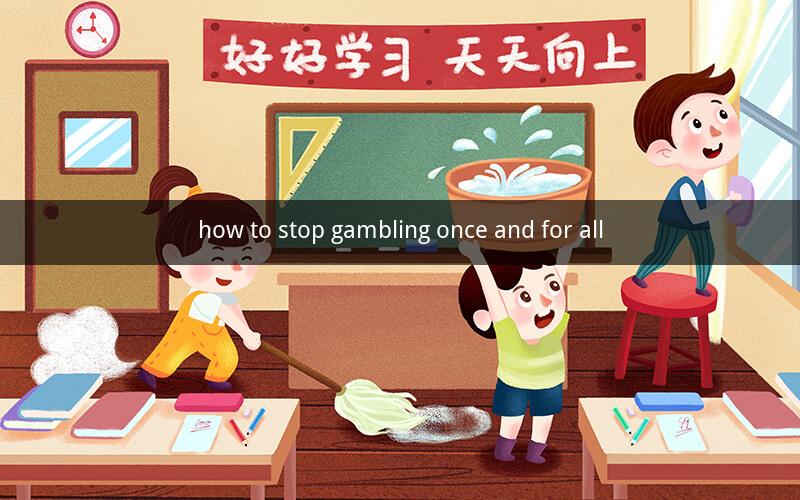
How to Stop Gambling Once and for All: A Comprehensive Guide
Table of Contents
1. Understanding the Problem
2. The Psychological Impact of Gambling
3. Identifying Triggers and High-Risk Situations
4. Building a Support System
5. Financial Management and Budgeting
6. Developing Healthy Coping Mechanisms
7. Professional Help and Therapy
8. Self-Reflection and Goal Setting
9. Staying on Track and Overcoming Relapse
10. Celebrating Success and Maintaining Sobriety
1. Understanding the Problem
Gambling addiction is a complex issue that affects millions of people worldwide. It is characterized by an inability to control the urge to gamble, despite negative consequences. To stop gambling once and for all, it is crucial to first understand the nature of the problem and its impact on your life.
2. The Psychological Impact of Gambling
Gambling addiction can have profound psychological effects, including anxiety, depression, and feelings of shame or guilt. Recognizing these emotional challenges is the first step in addressing them and seeking the necessary support.
3. Identifying Triggers and High-Risk Situations
Triggers are situations or stimuli that make you want to gamble. Identifying these triggers is essential to avoid them and prevent relapse. High-risk situations, such as financial difficulties or stressful life events, can exacerbate gambling addiction and should be carefully managed.
4. Building a Support System
A strong support system can provide emotional support, guidance, and encouragement throughout your journey to stop gambling. This may include friends, family, support groups, or professional therapists.
5. Financial Management and Budgeting
Gambling addiction often leads to financial problems. To overcome this, it is important to take control of your finances. Create a budget, eliminate credit card debt, and seek financial counseling if needed.
6. Developing Healthy Coping Mechanisms
Instead of turning to gambling as a coping mechanism, find healthier alternatives. Engage in activities that provide relaxation and fulfillment, such as exercise, meditation, or hobbies.
7. Professional Help and Therapy
Professional help can be invaluable in overcoming gambling addiction. Therapy, such as cognitive-behavioral therapy (CBT), can help you identify and change negative thought patterns and behaviors associated with gambling.
8. Self-Reflection and Goal Setting
Take time to reflect on your reasons for wanting to stop gambling. Set clear, achievable goals and develop a plan to reach them. Celebrate small victories along the way to stay motivated.
9. Staying on Track and Overcoming Relapse
Relapse is a common challenge in overcoming addiction. To stay on track, be prepared for setbacks and have a plan in place to address them. Reach out to your support system and seek professional help if needed.
10. Celebrating Success and Maintaining Sobriety
Once you have successfully stopped gambling, take time to celebrate your achievements. Maintain sobriety by continuing to engage in healthy coping mechanisms, seeking support, and staying vigilant against triggers.
---
Questions and Answers
1. Q: What are the signs of a gambling addiction?
A: Signs include an inability to control gambling, lying about gambling activities, neglecting responsibilities, and experiencing negative consequences due to gambling.
2. Q: How can I identify my gambling triggers?
A: Reflect on situations that make you want to gamble, such as social events, financial stress, or emotional turmoil. Keep a journal to track these triggers.
3. Q: What is the role of therapy in treating gambling addiction?
A: Therapy can help you understand the underlying causes of your addiction, develop healthier coping mechanisms, and change negative thought patterns.
4. Q: How can I manage my finances if I have a gambling addiction?
A: Create a budget, eliminate credit card debt, and seek financial counseling. Consider setting up an account for gambling expenses to keep them separate from other funds.
5. Q: Are there any support groups for gambling addiction?
A: Yes, there are numerous support groups, such as Gamblers Anonymous, that provide peer support and resources for overcoming addiction.
6. Q: Can exercise help with gambling addiction?
A: Yes, exercise can be a healthy coping mechanism, reducing stress and promoting overall well-being.
7. Q: How can I stay motivated to stop gambling?
A: Set clear, achievable goals, celebrate small victories, and remind yourself of the negative consequences of gambling.
8. Q: What should I do if I relapse?
A: Acknowledge the relapse, seek support from your support system, and recommit to your goals. Learn from the experience and adjust your plan if necessary.
9. Q: Can I still enjoy gambling in moderation if I have an addiction?
A: No, it is difficult to control the urge to gamble in moderation if you have an addiction. It is important to avoid all forms of gambling to maintain sobriety.
10. Q: How long does it take to overcome a gambling addiction?
A: The duration of recovery varies for each individual. Some may experience immediate success, while others may require ongoing support and therapy for several years.